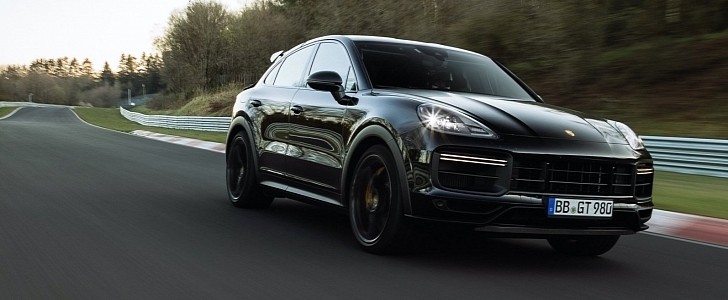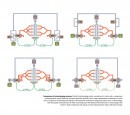When it comes to sustainable propulsion systems, Porsche is one of the carmakers that want to cover all the bases. Besides the electric Taycan and e-fuel production, the sportscar maker is also working behind the scenes to convert the combustion engine to run on hydrogen.
Porsche is already an accomplished EV maker, thanks to Taycan’s success. The first performance electric vehicle from Stuttgart proved its worth on the racetracks at home and abroad. But Porsche also thinks there’s more to the combustion engine than most people believe today. This is why Porsche has bet big on synthetic fuels, which are just like gasoline, only made from sustainable materials. And similar to Toyota, Porsche also works to make regular engines run on hydrogen.
The problem with hydrogen combustion engines is their low specific output of around 50 kW per liter of displacement. This is OK for big truck engines, like the ones that Cummins is working on, but not quite suitable for use in a small vehicle, not to mention a sportscar. That’s why Porsche is working on a combustion engine with a significantly higher specific output to power the most demanding performance vehicles of the future.
“We have developed a hydrogen combustion engine that aims to match the power and torque of current high-performance gasoline engines as a concept study,” says Vincenzo Bevilacqua, Senior Expert Engine Simulation at Porsche Engineering. “The starting point for our study was an existing 4.4-liter V8 gasoline engine – or rather, its digital data set since we conducted the entire study virtually using engine performance simulations.”
Porsche used a higher compression ratio and hydrogen-specific combustion to increase the specific output. Still, the most essential part was a new turbocharging system since hydrogen engines need twice as much air mass as their gasoline counterparts. Unfortunately, the exhaust gas temperatures are much lower, which results in a lack of energy to propel the turbine. This discrepancy needs a fresh approach to solve, so Porsche imagined four alternative turbocharging solutions.
All systems consist of several electrically assisted turbochargers, some combined with additional control valves in the air system or electrically driven compressors. Each system has its own advantages and flaws, so the right compromise is needed, depending on the requirements profile of the engine.
For the engine study, Porsche selected a turbocharging system with back-to-back compressors. This features a coaxial arrangement of two compressor stages driven by the turbine or the supporting electric motor using a common shaft. The process air flows through the first compressor, is cooled in the intercooler, and recompressed in the second stage.
Using this system, Porsche’s virtual hydrogen engine developed a total of 440 kW (590 horsepower), which is on par with the original gasoline unit. Installed in a virtual performance vehicle with a total weight of 2,650 kg (5,842 lbs), it can achieve a lap time of eight minutes and 20 seconds on the Nürburgring’s Nordschleife. The best part: this performance is possible without hydrocarbons, particulates, or carbon monoxide emissions.
The only emissions a hydrogen combustion engine releases are nitrogen oxides. Porsche thinks it can optimize combustion to limit NOx emissions to a level that complies with the Euro 7 standard. Porsche claims this is possible even without an exhaust after-treatment system. However, we’ve heard the same a few years back about Volkswagen’s (and Porsche’s) diesel engines, so take that with a grain of salt.
The hydrogen engine should be not only clean but also highly efficient, thanks to its lean combustion. Porsche also says it has a comparable cost with a similar gasoline engine. The turbocharger system and some mechanical components could be more complex and, therefore, more expensive. Still, the lack of an exhaust gas after-treatment system compensates.
If you are wondering when such an engine will power a series-production sports car, there’s no timeline for that. It might never enter production in its current form, but Porsche says this was not the goal. Instead, Porsche engineers wanted to explore the technical potential of such an alternative drive and gain valuable insights into high-performance hydrogen engines.
The problem with hydrogen combustion engines is their low specific output of around 50 kW per liter of displacement. This is OK for big truck engines, like the ones that Cummins is working on, but not quite suitable for use in a small vehicle, not to mention a sportscar. That’s why Porsche is working on a combustion engine with a significantly higher specific output to power the most demanding performance vehicles of the future.
“We have developed a hydrogen combustion engine that aims to match the power and torque of current high-performance gasoline engines as a concept study,” says Vincenzo Bevilacqua, Senior Expert Engine Simulation at Porsche Engineering. “The starting point for our study was an existing 4.4-liter V8 gasoline engine – or rather, its digital data set since we conducted the entire study virtually using engine performance simulations.”
All systems consist of several electrically assisted turbochargers, some combined with additional control valves in the air system or electrically driven compressors. Each system has its own advantages and flaws, so the right compromise is needed, depending on the requirements profile of the engine.
For the engine study, Porsche selected a turbocharging system with back-to-back compressors. This features a coaxial arrangement of two compressor stages driven by the turbine or the supporting electric motor using a common shaft. The process air flows through the first compressor, is cooled in the intercooler, and recompressed in the second stage.
Using this system, Porsche’s virtual hydrogen engine developed a total of 440 kW (590 horsepower), which is on par with the original gasoline unit. Installed in a virtual performance vehicle with a total weight of 2,650 kg (5,842 lbs), it can achieve a lap time of eight minutes and 20 seconds on the Nürburgring’s Nordschleife. The best part: this performance is possible without hydrocarbons, particulates, or carbon monoxide emissions.
The hydrogen engine should be not only clean but also highly efficient, thanks to its lean combustion. Porsche also says it has a comparable cost with a similar gasoline engine. The turbocharger system and some mechanical components could be more complex and, therefore, more expensive. Still, the lack of an exhaust gas after-treatment system compensates.
If you are wondering when such an engine will power a series-production sports car, there’s no timeline for that. It might never enter production in its current form, but Porsche says this was not the goal. Instead, Porsche engineers wanted to explore the technical potential of such an alternative drive and gain valuable insights into high-performance hydrogen engines.









